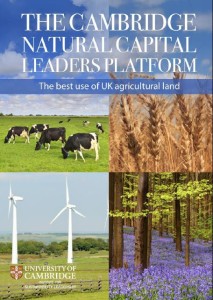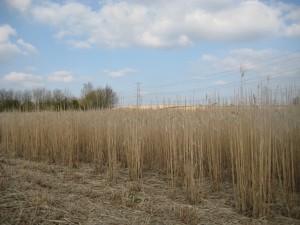Influential report recognises multifunctional benefits of energy crops
 Back in June a very influential report called “The best use of UK agricultural land” was produced by the University of Cambridge’s Institute for Sustainability Leadership (CISL). The significance of the report is that it is backed by big food organisations such as ASDA, Sainsbury’s, Nestle as well as the NFU and CLA as part of CISL’s Natural Capital Leaders Platform.
Back in June a very influential report called “The best use of UK agricultural land” was produced by the University of Cambridge’s Institute for Sustainability Leadership (CISL). The significance of the report is that it is backed by big food organisations such as ASDA, Sainsbury’s, Nestle as well as the NFU and CLA as part of CISL’s Natural Capital Leaders Platform.
In our experience of reading many of these reports, we typically come across entrenched, polemic views of “food versus fuel”, how biomass energy is “dirtier than coal”, how energy crops are going to cover entire countries and stating a preference for native trees over fast growing alternatives.
So we were surprised and delighted to find that this report is very well informed, holistic and objective and takes account of all the needs that our society will have for UK agricultural land in the future. These include:
- Food security
- Energy security
- Better protection of nature and its services, and the reversal in the decline of key ecosystems
- Improved competitiveness and more diversified income sources for farmers and UK agricultural land based businesses
- Enhanced recreational space and amenity value
The report identifies that we are in trouble – the demand for land is far greater than that available. Various scenarios are considered but in the best case we will be 0.9 million hectares short of the land needed to support a predicted population of 70 million by 2030. In the worst case scenario we might be short by 6 million hectares. The lack of land on our small island nation will mean that we need to make tough choices so we can get the maximum from our 18 million hectares of farmland.
Crops for Energy have been trying to draw the attention of policy makers to the multifunctional benefits of perennial energy crops for years now, so it’s really satisfying that this is recognised in the report and endorsed by some really big food and farming industry players.
The report says:
“Given that agricultural land can provide a very wide range of goods and services, it is vital that all of these are recognised and quantified. This includes provisioning services (such as food, fibre, fuel and water), regulating services (such as carbon storage, water purification, flood protection and clean air), cultural services (including education, recreation and aesthetic value) and social impacts (such as rural livelihoods and employment.”
“Where land can deliver multiple benefits – such as forestry or perennial crops providing both a source of timber and energy as well as water management, carbon storage and wildlife benefits – all of these should be understood, valued and their multiple delivery actively encouraged and rewarded”.

The CISL report recognises the loss of pollinators as a key ecosystem service that is being degraded. Pollinators have an estimated value to UK agriculture of £430 million per annum. Male SRC willow varieties provide an abundant source of pollen at a critical time of year. These crops could therefore provide a massive service to UK food production and this should be rewarded with incentives.

The report suggests that more land could be made available for perennial energy crops like miscanthus by increasing food crop yields, reductions in food waste and changes to eating habits (e.g. reduction in meat and dairy consumption).
This is great news for a small industry that has struggled to get noticed. One has to hope when such views come by way of the University of Cambridge and large multinational companies that policy makers will sit up and take note.
In summary the report suggests the following:
- Opportunities to deliver multiple benefits from the same land should be identified and encouraged
- A cost-benefit analysis should be undertaken to place financial values on many of the goods and services and incentives designed to protect those which are not fully rewarded by the market
- Government should develop an integrated action plan across all key Government departments to consolidate existing agricultural land use policies and actions,
- A joint Industry and Government group should be set up to review and build on this analysis.
In the coming weeks Crops for Energy (through our involvement in the EU funded Rokwood project) will be formally releasing four policy briefs in which we will set out the UK clusters views on what is required to get the energy crops sector back on track. Watch this space!